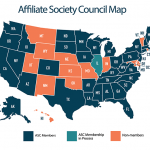Unfortunately, every insurance notification we’ve received about a problem policy isn’t as easily resolved. Noridian, a Medicare carrier, has also created problems regarding infusion payment policies. The ACR has sent numerous letters and has worked with the state and local societies to encourage members to support our confrontation of this carrier. The ACR remains vigilant and continues to apply pressure encouraging the insurance company to adjust their policies for appropriate reimbursement and to maintain needed access for patients.
If you have problematic insurance policies in your state, I encourage you to contact the ASC delegate from your state society, and the ACR will work with you to help resolve the issue. We have found that it definitely helps to have a letter of support from both the ACR and your local state society as you address these issues.
Join the ASC
Societies interested in being a member of the ASC are invited to apply, and membership information is available online at www.rheumatology.org under Practice Support. You may also visit the Web site to see a complete list of ASC benefits and view a list of current ASC members. If you have questions about the ASC, contact Antanya Chung at (404) 633-3777, ext. 818, or [email protected].
State/Local Society Membership in the ASC
By becoming an affiliate society, you not only have representation in the ASC, but your society also receives these benefits:
- Presentations at your local meetings: An ACR board member will attend your society meeting to provide an update on ACR activities that may be of interest. This gives local society members an opportunity to interact with an ACR board member, who can in turn bring local-level concerns from the state back to the ACR Board. ACR staff are also available for presentations.
- Regular ASC meetings: the ASC met in March, and the agenda contained several controversial topics, including quality initiatives, patient-centered medical home, and tier-4 pricing. Dan Solomon, MD, MPH, past chair of the ACR Quality of Care Committee, attended to discuss the ACR’s quality initiatives. The dialogue provided an opportunity to clear up some confusion about the ACR’s initiatives, hear concerns about these efforts, and opened lines of communication even further. The council ran out of time because of the intense discussion, but agreed to continue the conversation on the ASC list serve, where they could invite many others to participate.
- Networking: Membership in the ASC provides an opportunity for networking with other members from across the country. Many ACR members are busy outpatient specialists, often in small practice settings, and thus have little opportunity to interact with colleagues to discuss challenges affecting rheumatology across the US. The ASC membership provides an opportunity to brainstorm about these challenges and consider what may be done in response.
- Supporting affiliate society activities: Through participation in the ASC, affiliate societies receive help with Web site development, communications via list serves and other methods, meeting space at the ACR Annual Scientific Meeting, and much more. The California Rheumatology Alliance took advantage of its meeting room at the 2008 ACR Annual Scientific Meeting in San Francisco and invited insurance carriers to discuss a variety of issues affecting California physicians. The meeting provided this group of members a rare opportunity network with colleagues and to ask questions of the carriers. Predictably, the discussion was animated and the room was packed.
Networking, sharing, discussing, and learning are the communication methods that allow the ASC to be successful. ASC delegates are encouraged to provide real, unvarnished feedback from the practicing community directly to the ACR Board and committees. Such feedback helps the ACR to better understand and respond to the challenges members face and to grow and improve as an organization.

